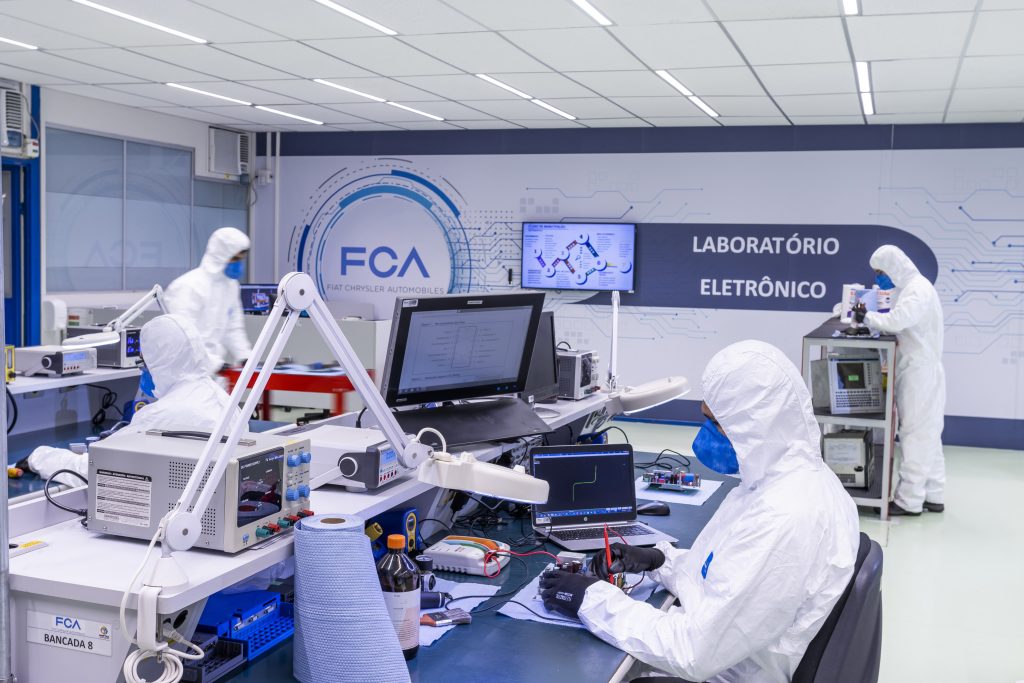São Paulo – Joining the efforts in fighting the new coronavirus, Brazil-based private companies are dedicating their assets, facilities and expertise in the service of the country’s healthcare sector. To support professionals treating infected patients, companies in different sectors are now manufacturing medical supplies.
Automotive company Fiat Chrysler Automóveis (FCA) reported it will implement a program to support actions to overcome the crisis resulting from the spread of COVID-19 in the country. The three main fronts are contributing to the building of campaign hospitals in the city of Betim, Minas Gerais, and Goiana, Pernambuco; using its expertise and funds to produce and supply strategic hospital supplies; and donations and accommodation of funds and material to support the healthcare system.
FCA is also producing plastic face protectors (pictured above) in 3D printers for donation. The items are being manufactured inside Fiat’s industry cluster, using the company’s know-how in engineering and design. FCA will manufacture around 2,000 pieces, which will be donated to the healthcare services in Minas Gerais and Pernambuco. The first units were produced last week and will be donated over the next few days.
Electrical machinery company WEG will use its plants in Jaraguá do Sul in Santa Catarina to produce artificial ventilators. Manuacturing will be enabled through a technology transfer agreement signed between the brand and Leistung Equipamentos Ltda, a medical and hospital equipment manufacturer. The contract gives WEG a license to produce a ventilator based on the technique of the Luft-3 mechanic lung ventilator.
The company’s plan is to make 50 ventiladors a day, to a total of 500 units, to be delivered in the second half of May. “We are now depending on obtaining the electronic and pneumatic components; most of them are imported and in shortage right now,” WEG Automação superintendent director Manfred Peter Johann was quoted as saying in a press release.
Shoe companies are also engaging by manufacturing medical coats and masks, the Brazilian Footwear Industries Association (Abicalçados) reported. “Our sector is working to contribute to the prevention of COVID-19, which is extremely important in the country. Moreover, our industry is focused in reducing the crisis impact on the economy and the life of the Brazilian people,” the Association’s executive president Haroldo Ferreira was quoted as saying in a press release.
Rio Grande do Sul-based sporting goods company Grupo Dass decided to manufacture 35,000 masks and 450 coats, which will be donated to hospitals and health centers. Children’s shoes manufacturer Klin based in Birigui, São Paulo, produced 4,000 masks before halting activities at four plants to prevent the spread of the virus. The items were delivered to employees and their families, and to elderly care facilities.
Santa-Catarina-based brand Renata Mello donated 1,500 meters of twill and 200 meters of cord to manufacture masks in Bahia, where it has a plant. And Arezzo&Co has mobilized fabric suppliers, factories and the Secretariat of Health of the State of Rio Grande do Sul, where it operates, to produce 25,000 protection masks. Over 12 plants lend their machineries so that volunteers produce the first lot and a packaging supplier took care of the organization in 100-unit packages.
Donations
Other footwear brands have promoted donations of its main products to hospitals and healthcare professionals. Rio Grande do Sul-based Boaonda, which produces protective footwear, donated dozens of pairs to the Hospital Municipal de Novo Hamburgo. Grupo Ramarim delivered around BRL 50,000 (USD 9,500) in its sneakers to public hospital in the cities where it has industrial plants in Rio Grande do Sul and Bahia. And Paquetá, also based in Rio Grande do Sul, gave pairs to Hospital Regina in Novo Hamburgo.
Arezzo&Co has donated 10,000 sneaker pairs of almost of all its brands to healthcare professionals. Cecconello, also from Rio Grande do Sul, promised to give 5% of its March revenue to Fundação Hospitalar Dr. Oswaldo Diesel in the city where it operates.
In the battery production sector, Grupo Moura contributed by donating 100,000 masks. The brand’s engineering teams developed a two-layer product with cotton and microfiber fleece, following the one used by the Chinese population for individual protection. At first, the donation will be given to the population, Grupo Moura’s employees and their families, and its resellers across the country.
And Leroy Merlin, a leading construction material retailer, announced a partnership with Movimento Brasil Contra o Vírus (the ‘Brazil Against the Virus Movement’) and has made available its Bricolab in the city of São Paulo to manufacture hospital protection masks with its eight 3D printers. “Our estimate is bringing more machinery to the store, because we have an adequate physical area,” Leroy Merlin Innovation manager was quoted as saying in a press release. The company intends to have produced 12,000 marks for donation within 3 months.
The initiative aims at supplying Brazil’s public and private healthcare units and, according to biomedical engineer Thabata Ganga, who created Movimento, over 450 professionals have showed interest in acquiring the masks.
Translated by Guilherme Miranda




